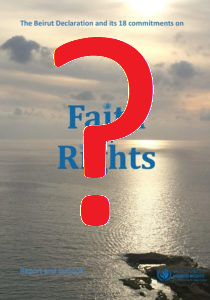Introduction
The Beirut Declaration and the Faith4Rights are projects of the United Nations Office of the High Commissioner of Human Rights (OHCHR), aimed to show how the faiths in the world are also pro-human rights. To be honest I was not aware of this document until I met Mr Ibrahim Salama (head of OHCHR treaty division) during my visit to Geneva (Switzerland) at the end of October 2018.
We had a very fruitful and interesting discussion over such a splendid dinner at Azar and Co. He introduced me to some Commitments agreed upon in the Beirut Declaration, and it seems that we had our disagreements. Such an awesome man, Mr Ibrahim asked me to write something about these 18 Commitments in English (since my other articles criticizing the OHCHR are in Bahasa Indonesia). I gladly agreed, because I find that this is within my interest as well despite the difference of opinion on how we both view the general idea.
Due to time constraint and other deadlines, it seems to be rather difficult to make a truly comprehensive analysis of the document (which could be downloaded here). To be honest I am not sure where to start because I really have too much to say about this document.
For example, I really am curious when the document said in page 12 (endnote 1) that the religious scripture references were offered by the participants of the conference. However, I am intrigued that such an official UN document agreed supposedly by inter alia ‘Muslim scholars’ (and probably would have gone through rigorous editing prior to publication) would have such an erroneous and misleading translation of Surah Al-Asr added by an incorrect verse reference on page 8.
Note that Surah Al-Asr has only 3 verses and is the second shortest chapter in the Qur’an (second to Surah Al-Kawthar) which probably all 3 billion Muslims (including most if not all toddlers, I guess) would have memorized by heart. I cant help but wonder, who in the 99 Names of Allah represented the Muslims in that declaration?
PS: if google somehow fails you, you can find the translation of Surah 103 in this link, and compare different translators too!
As a journal editorial staff (and previously a managing editor), I am also itching inside seeing numerous inconsistencies in the formatting, but this is not substantial. Before anyone protests about my own post not having a consistent formatting, well this is my personal blog so I am not being too meticulous so please do not compare my blog with an official document of the No. 1 and largest international organization in the world merci beaucoup. Not to mention curious and ‘eyebrow-raising’ interpretations of ahadeeth and Quranic verses all over the place, as well as a quote containing major kufr from a sufi poet known for such deviance placed right on the top of the document.
After discussing with some of my friends, who are pious and learned da’ees as well as professionals in various fields, I thought that maybe in the future I should assemble a team to make a proper commentary. I have major disagreements on what these rights are, to what extent do we understand them, and the unfair and unjust imposition of ‘western human rights’.
However, for now, maybe I will just make a ‘short’ commentary on the 18 Commitments based on what I understand of my deen (Islam). I chose to do it this way, because the 18 Commitments are basically a summary of what has been agreed upon by the participants of the Beirut Declaration. Not as short as many would hope since there are 18 Commitments, but I will be as brief as I can (and quite a number of them are interlinked so I combined my comments to them). To make it less tedious to read in one go, inshaaAllah I will be dividing this into a few posts (which are interlinked to each other).
Before I proceed, I must clarify first that it is not that I, as a Muslims, do not believe that there are fundamental rights of humankind bestowed upon them by their mere virtue of being a human (be careful with the double negative there). Islam does have a concept of human rights which Muslims believe to be the best, although I am not suggesting that we do not have homework in working up the details on the level of fiqh (and let us not mention the homework in the actual implementation of it!). My most recent work with my mentor and colleague and boss Prof Dr Sigit Riyanto touched on this, unfortunately also in Indonesian and still unpublished so far (we completed our research literally two weeks ago at the time this post was uploaded, and now still completing the administrative reports).
So, here goes.
Bismillaahi al-Rahmaan al-Rahiim
MY COMMENTARY:
To the commentary towards Part 2: Commitments I to III ====>
To the commentary towards Commitments IV to X (+XII and XIII) ====>


Livequranforkids
We are providing the educational service of Learn quran
online, female quran teacher,quran for kids, quran reading,
quran memorization for kids, quran translation,online quran,
quran for kids in USA, quran online and Online quran academy.